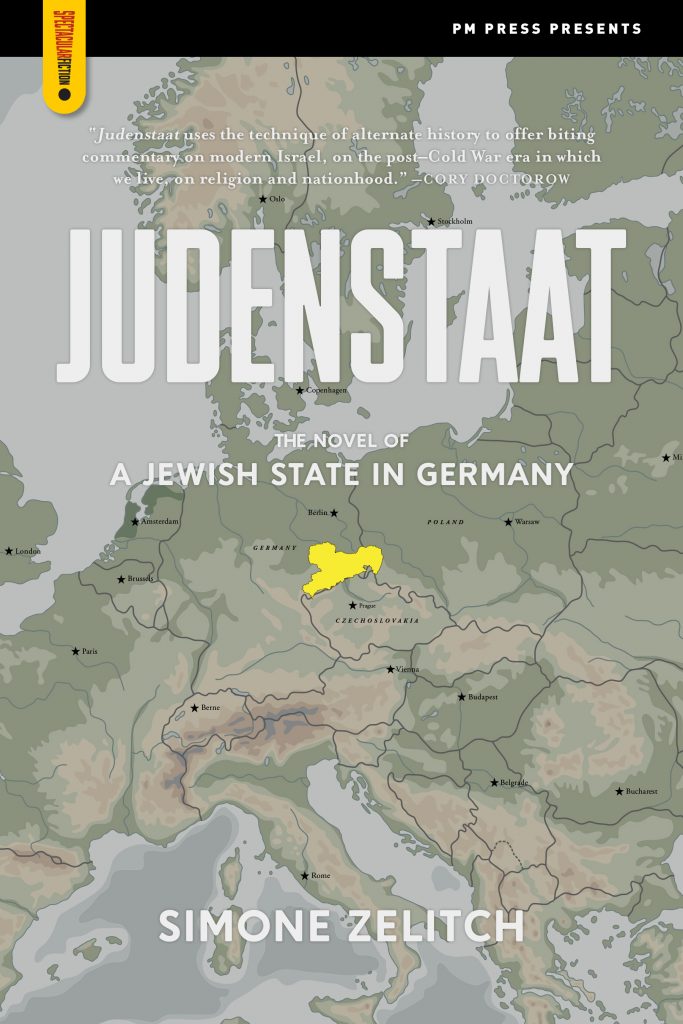By Simone Zelitch
December 9th, 2017
We’re living in an alternative-history moment. Given the current political climate, it’s no coincidence that most of us are in full flight from the present. Instead, we look over our shoulders, and endlessly revise the past.
Now, after President Trump’s recognition of Jerusalem as the capital of Israel, here’s one more revision: What if there had been no Balfour Declaration?

November marked the centennial of that 1917 document, which begins: “His Majesty’s Government views with favour the establishment in Palestine of a national home for the Jewish people and will use their best endeavours to facilitate the achievement of this object.”
The Balfour Declaration was hardly altruistic. As England, France and Italy prepared to divide a defeated Ottoman empire, England wanted access to the Suez canal, a link to their colony in Egypt, and although one could argue that the endorsement grew out of respect for the Zionist project, it also was based on a familiar anti-Semitic trope: Jews have money, influence and power, and it makes good sense to get them on your side.
Far more could be written about division in the world Jewish community about a homeland in the territory of Palestine, or indeed division among Zionists themselves. Indeed, far more could be written about the many promises made to many of the people in the region who hardly expected their homelands to be divided like a Christmas pudding. These subjects have been discussed so thoroughly that it’s hard to get through the dense competing ideologies, and find a clear pattern of legitimate facts.
What haunts me instead is this: Jews, Muslims and Christians lived in Jerusalem, Jaffa and Hebron for generations before those cities were part of a country with fixed borders; rather, those cities and the surrounding countryside were under the jurisdiction of the Ottoman Empire, with a government so inefficient that it might as well have not been there at all. What was life like for Jews in the area that Balfour referred to as Palestine?
This is one of the questions addressed in Menachem Klein’s 2014 book, Lives in Common, which focuses on Arabs and Jews in those three cities before the British Mandate, and

goes on to explore how relationships were transformed by emerging national identities in the years that followed. The early chapters of the book describe a time when Arab and Jew weren’t separate, contradictory categories; in fact, there were Arab Jews, indigenous and integrated into their communities, without distinct national aspirations.
Klein gives us tantalizing portraits of Jewish musicians playing at Muslim weddings, of Jewishan and Muslim families mingling in common courtyards, of bathhouses that date from the Mamluk period used by Jewish women as mikvahs, of the 451 Arabic words that found their way into Yiddish, of cafes in cosmopolitan Jaffa where Arabic mixed with Ladino, and men would gather to play dominoes, talk politics, and read the local newspaper, Falastin.
Of course, these “lives in common” are complicated by real prejudices that pre-date the Balfour Declaration. Under the Ottomans, Jews were second-class citizens, and Muslim and Christian Arabs made clear distinctions between “local” (Arab or Sephardic) Jews and “Muscovites” who were considered invaders, Ashkenazic Jews under the protection of European embassies, whether they were strictly religious and dependent on charity, or secular Zionists farming on property they bought from absentee landlords in Damascus.

Yet it’s worth considering: if Britain hadn’t supported Jewish nationalism, would Arab nationalism have turned in the direction of antisemitism? What if the territory we call Israel or Palestine was part of an Arab country with borders that may not in any way resemble the borders we see on maps today? Would Zionists continue farming and reviving the Hebrew language there? If Ottoman restrictions remained, would those Zionists unite with Sephardim, Ashkenazim and Arab Jews to demand full citizenship in this imaginary country?
Of course, this speculation may, in the end, be just as likely or unlikely as the vision asserted in the Balfour Declaration, particularly when we read beyond the initial phrase and find that the document endorses its homeland for the Jews with caveats: “[…] it being clearly understood that nothing shall be done which may prejudice the civil and religious rights of existing non-Jewish communities in Palestine…”

It is possible for any “national home” to meet the Balfour Declaration’s standards? Israel can’t now, and year by year, that goal feels more remote. Yet Israel is not alone. In 2017, we struggle with the consequences of national homes. The collapse of the Soviet Union, much like the collapse of the Ottoman Empire, left a map to be re-drawn. In this case, the new borders are defined and defended in ways that reflect ferocious ethnic and religious prejudices that we haven’t seen for generations.
So what about Jerusalem, with its gold stone, cramped alleys, angry fanatics, and bedazzled tourists? That city is, of course, a magnet and an incubator for these prejudices. It’s tempting to wish Jerusalem was blasted into orbit as a satellite, a kind of golden moon, an aspiration.
We can wish the same of nations, that identity, language and culture could develop without armies and borders. Some influential Zionists like Martin Buber and Ahad Ha’am explored this possibility. We can’t revise history, but we can revisit missed opportunities and see if they lead us away from the dead end we’ve clearly reached today
As Zionism’s founding spirit, Theodor Herzl, once wrote, “If you will it, it is no dream




